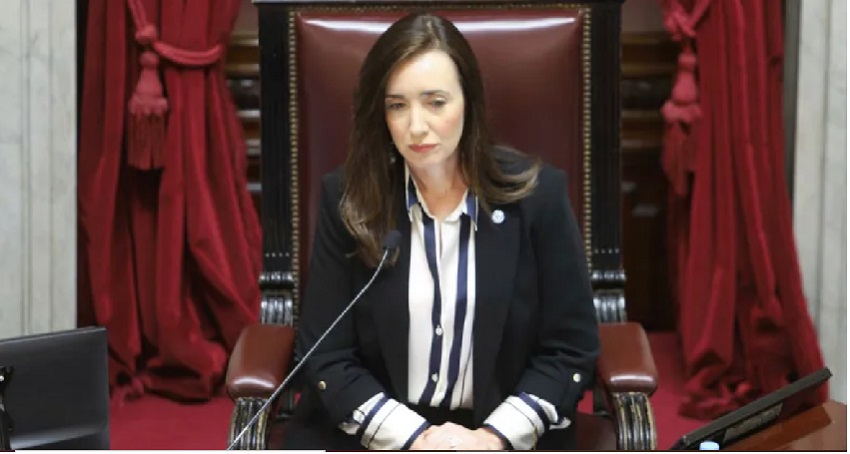
Just a little after having suffered a tough defeat in the Senate, in what was the approval of the University Financing project that became law and now Javier Milei threatens to veto it, just as he did with the increase for retirees, the ruling party chained a second consecutive defeat in the upper house: during the early hours of this Friday, the rejection of the decree of necessity and urgency 656/24 was approved, corresponding to the allocation of reserved funds for the State Intelligence Secretariat.
The result of the vote was 11 votes in favor of the decree, 49 against and 2 abstentions. For the first time in history since the regulation of the DNU has been in place, a decree of necessity and urgency has suffered this fate.
The 6 senators from La Libertad Avanza, Carmen Alvarez Rivero, Beatriz Avila and Luis Juez from Pro, and Carlos Espínola and Edgardo Kueider from Unidad Federal, voted in favor of the DNU.
Senators from UP and the Radicals, Alfredo De Angeli and Guadalupe Tagliaferri (Pro), Francisco Paoltroni and Edith Terenzi from Chubut, voted against.
Although they had said they would abstain, the missionaries Carlos Arce and Sonia Rojas Decut left the room before voting. Neither were present at the vote Lucía Corpacci, Silvina García Larraburu and Gerardo Montenegro; the radicals Mariana Juri and Rodolfo Suárez; and the Rio Negro native Mónica Silva. The abstentions corresponded to the Chubut native Andrea Cristina and the missionary Enrique Göerling Lara, both from the Pro.
Earlier, the University Financing Law had been approvedwith 57 votes in favor, 10 against and 1 abstention.
Just yesterday there were mobilizations of the university community to the National Congress warning that “If there is a veto, there will be a strike and a mobilization like on April 23.”
The plan from the march was clear: “We are in front of the National Congress to demand the approval of the University Financing Law and a salary increase for teachers and non-teaching staff. If there is a veto, there will be a strike and a new university mobilization like the one on April 23rd.” indicated the Teachers’ Union Association of the University of Buenos Aires.
In turn, also from student sectors That voice was heard. “On April 23, it became clear that when there is an attack on public education and the university, people mobilize en masse. That is something that Milei and Patricia Bullrich will take into account when thinking about whether to veto the university budget law. Added to that, There are many students and teachers who want to fight for the retirees and today there was a lot of denunciation in Congress about what happened yesterday. That is also another aspect that Milei has to take into account when attacking education because those claims can be united and that can be very important to face the joint attack. That explains the need for a general strike.”stressed Luca Bonfante, student and member of the General Secretariat of the Center of Philosophy and Letters Students of the UBA (CEFyL).
Also, from the stage set up outside, university professor and National Deputy (PTS-Frente de Izquierda) Christian Castillo spoke: “The university financing bill, if we managed to get the half-sanction in the Chamber of Deputies earlier, is because on April 23 there was a real tide in 70 cities across the country, 1.2 million university students took to the streets and forced them to put on the agenda what they wanted to ignore.” “They didn’t want to include salaries in the law, very few of us mentioned it. After the march they could no longer look the other way. If we vote today, we are preparing to face the veto. Once again we have to take to the streets and defeat those who want to turn back.”
The cuts to universities have already accumulated 30% so far this year, compared to the same period last year, as can be seen from the report prepared by the Congressional Budget Office. Progress scholarships were cut by 65%.
Milei announced that he will veto the law if it is approved, although its impact in budgetary terms is only 0.14% of GDP and it is a recomposition of the adjustment already made, it does not mean an improvement with respect to the previous deterioration but it does mean a “shield” against future attempts at inflationary liquefaction.
The vice-rector of the UBA, Emiliano Yacobitti, former deputy for the UCR, also attended the rally. He joined the demands for the financing law and told the television cameras that “if the President vetoes the law, surely when Congress is in session you will have society mobilized” and that there will be many deputies “who will make the effort” to obtain the two-thirds necessary to insist on the law.
This urgency and urgency is not the same as that maintained by the block of deputies in Congress when the law was discussed in April. One day after the huge university mobilization of April 23, the “dialogue-minded opposition” shamefully absented itself from the special session in which the university budget, Fonid and retirement mobility were to be discussed. Several of those absent, demagogically, hours before had taken photos of themselves participating in the massive mobilizations. This is the case of Martín Lousteau and Rodrigo de Loredo.
Not content with that, a few days later the deputies of the UCR bloc that depends on Yacobitti voted for the partial approval of Milei’s Ley Bases, as did the radical deputy Mariela Coletta, former president of the Center of Students of Economic Sciences of the UBA.
If Milei vetoes the university financing law, he will encounter enormous resistance in the streets. But it is a fight that must be prepared, to guarantee the increase in the university budget, but also the fight against the entire adjustment plan. For that We need a democratic, grassroots organization in all the country’s faculties and universities. We cannot rely on negotiations from above with the authorities, who are the same ones who demobilized after the massive march in April.
As Juan Manuel Astiazarán also stated in The Left Daily, It is essential to unify all the demands on the streets if we really want to defeat Milei. The image of the Plaza Congreso this Wednesday in the mobilization for the veto of the increase in pensions exposed the policy of the union leaderships and the CGT, which directly erased themselves and left the fight for pensions abandoned. An important call, which could have been much more multitudinous with a national strike to guarantee a massive mobilization and defeat the veto in the streets. Far from that, some did not directly call and others made a acting with a modest mobilization of their “organic bodies” and then withdrew early.
If there is a real intention to confront the government’s attacks, adequate measures are needed. We need to meet again in the streets, as happened on April 23 of this year in the great university march, where workers, retirees and students came together to show their support for Milei.
Source: www.laizquierdadiario.com

